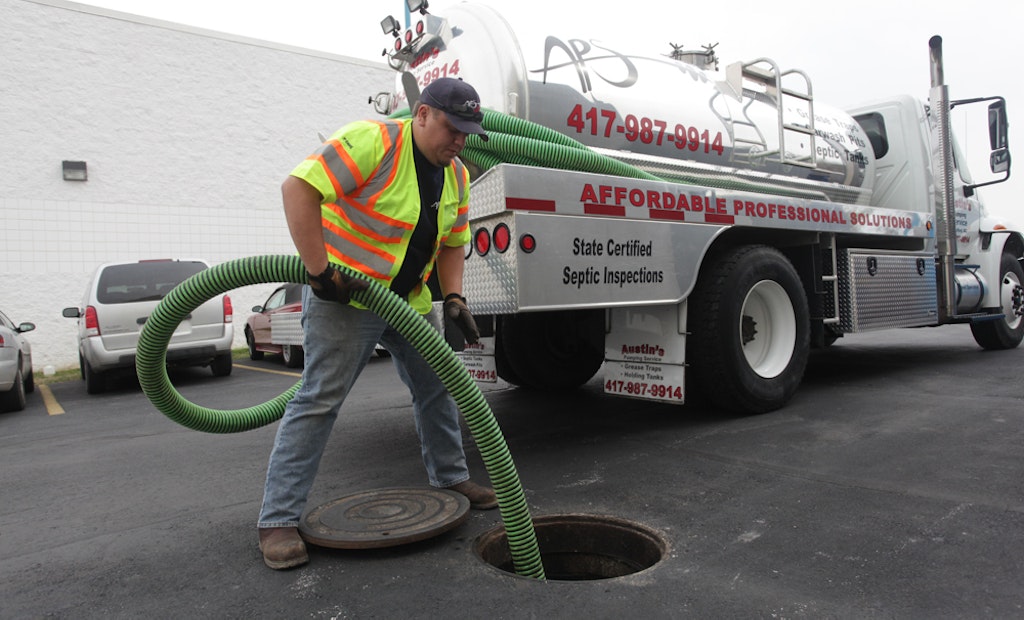
Interested in Onsite Systems?
Get Onsite Systems articles, news and videos right in your inbox! Sign up now.
Onsite Systems + Get AlertsTom Ferrero spends a lot of time thinking about a topic most people would prefer to avoid: what to do with waste from septic tanks and businesses, including grease from fryers. The chief operating officer of FRANC Environmental Inc. in Horsham, Pennsylvania, works with pumpers to find the best ways to dispose of their waste.
It’s more complicated than you might think.
“A lot of guys don’t think much about it and just head over to the wastewater treatment plant,” he says. “But that’s not the best answer for everybody. What if you show up there and they tell you they won’t take your stuff because you have grease trap waste and they’ve stopped taking it. Pumpers need to think carefully about how to deal with their waste.”
While Ferrero works for FRANC Environmental, which offers a variety of septic system and wastewater management services to homeowners, businesses and municipalities, he’s also secretary for the National Association of Wastewater Technicians and presents programs nationwide. He says pumpers have three main options when it comes to waste disposal: visit the wastewater treatment facility, land application, or pretreat the waste themselves and then dispose of it.
“The first two options are historically what has been done while the third is a blend of the first two,” he says. “All of them have pluses and minuses, but that’s why we stress to pumpers they need to have a business plan in place to help figure all of this out.”
Pumpers need to carefully evaluate their business to find the option or options that’s best for them, Ferrero says. “You have to look at the issue and run numbers to see what’s best,” he says.
Going to the wastewater treatment plant creates a lot of uncertainty and pumpers are on the plant’s timeline. “Some places are open between just 9 a.m. and 4 p.m. and won’t take any new arrivals after 3:30. Those are things you need to be aware of,” he says.
Another uncertainty is pricing. Ferrero has known pumpers who suddenly saw their fees double. “Pricing can go up without much notice. Then what are you going to do?” he says. “Treatment plants are also more narrow in what they’ll take and that’s something else pumpers need to consider.”
For pumpers looking at land application, there’s even more to consider, Ferrero says. For example, weather can throw a wrench in a pumper’s timing since waste can’t be applied when it’s raining. Pumpers also need to apply lime to their waste material and depending on state rules and regulations they may need to wait a certain amount of time before they can begin spreading.
“You could have some time of people just standing around and waiting depending on how things work out,” he says.
Then there’s another issue pumpers need to deal with: neighbors. “There’s a lot of ‘Not in My Backyard’ going on and some farmers are getting more hesitant about land spreading. They don’t want neighbors to become upset about any potential odor,” Ferrero says. “Depending on what’s going on in a certain area, there may be limits to where you can spread.”
The final option – treating the waste yourself – is Ferrero’s favorite. By separating out the solids and liquids, pumpers can do something different with each kind of waste.
“You could apply the thickened sludge to the land and then take the treated water and run it down the pipe,” he says.
A big advantage to treating the waste yourself is that you are in control, Ferrero says. “There’s definitely some management involved. You need to make sure you have the necessary permits and have a plan for what to do with the sludge and water, but it’s you making the decisions.”
Another advantage to running your own treatment plant is that pumpers don’t need to worry about being “turned away” at the treatment plant if they’ve reached their limit for the day, Ferrero says.
To determine if this option is for them, Ferrero recommends pumpers develop a thorough business plan that includes a profit and loss summary and estimates for all the costs involved.
“Are you going to need more equipment? If yes, how much will that cost and will you be able to recoup the expense by being able to take on more waste? These are all things pumpers need to think through,” he says.
Figuring out costs is essential to pumpers no matter which method they choose, Ferrero says. For example, if a wastewater treatment plant 50 miles away charges only 3 cents per gallon but the local plant charges 8 cents per gallon, is it worth the transportation costs and time to drive to the other location to save 5 cents per gallon?
One cost area pumpers rarely consider is their time, whether it’s spent driving to a treatment plant in the next county or spending time managing the pretreatment process if they go that route, Ferrero says.
Zoning can also be another concern if pumpers decide to open an onsite treatment facility. He says pumpers need to make sure that local rules allow what they plan to do.
“If you’re going to tap into a local (sewer) pipe, you need to make sure you know what the sewer ordinances are and follow them,” Ferrero says. “I will say that for people who decide it makes economic sense for them to treat the waste themselves, they don’t have regrets. They find they’re actually able to grow their business.”
Ferrero enjoys working with pumpers on making business decisions. “It’s really important to have someone there who can walk them through the entire process and say, ‘Have you thought of this?’ or ‘Have you thought of that?’ It’s beneficial for pumpers to have all that information available to them before they make a decision on what to do with their waste.”





